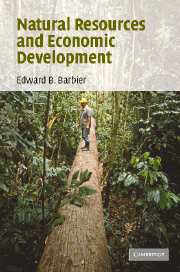Book contents
- Frontmatter
- Contents
- List of figures
- List of tables
- Acknowledgments
- Introduction
- 1 Natural resources and developing countries: an overview
- 2 Natural resource-based economic development in history
- 3 Does natural resource dependence hinder economic development?
- 4 Frontier expansion and economic development
- 5 Explaining land use change in developing countries
- 6 The economics of land conversion
- 7 Does water availability constrain economic development?
- 8 Rural poverty and resource degradation
- 9 Can frontier-based development be successful?
- 10 Policies for sustainable resource-based development in poor economies
- References
- Index
6 - The economics of land conversion
Published online by Cambridge University Press: 06 July 2010
- Frontmatter
- Contents
- List of figures
- List of tables
- Acknowledgments
- Introduction
- 1 Natural resources and developing countries: an overview
- 2 Natural resource-based economic development in history
- 3 Does natural resource dependence hinder economic development?
- 4 Frontier expansion and economic development
- 5 Explaining land use change in developing countries
- 6 The economics of land conversion
- 7 Does water availability constrain economic development?
- 8 Rural poverty and resource degradation
- 9 Can frontier-based development be successful?
- 10 Policies for sustainable resource-based development in poor economies
- References
- Index
Summary
The previous chapter examined empirical evidence of the main factors behind land use change in developing countries. The chapter noted that many economic analyses of tropical deforestation and land conversion have emphasized the important role of institutional factors. In the “synthesis” cross-country panel analysis of agricultural land expansion in tropical countries, various institutional factors were considered, but only control of corruption appeared to be significant. However, it was also noted that one key institutional factor, the prevalence of open access conditions in frontier regions, could not be included adequately in the “synthesis” analysis, as to date an adequate cross-country data set on property rights and land ownership conditions does not exist for developing economies.
As emphasized throughout Part One of this book, the problem of open access and poorly defined property rights may have a significant influence on patterns of economic development and resource management in low and middle-income economies. One group of theories explored in Chapter 3 appears to suggest an open access exploitation hypothesis as an explanation of the poor economic performance of resource-dependent developing countries. According to this hypothesis, opening up trade for a developing economy dependent on open access resource exploitation or poorly defined resource rights may actually reduce welfare in that economy (Brander and Taylor 1997 and 1998a; Chichilnisky 1994; Hotte et al. 2000; Southey 1978).
- Type
- Chapter
- Information
- Natural Resources and Economic Development , pp. 209 - 241Publisher: Cambridge University PressPrint publication year: 2005



